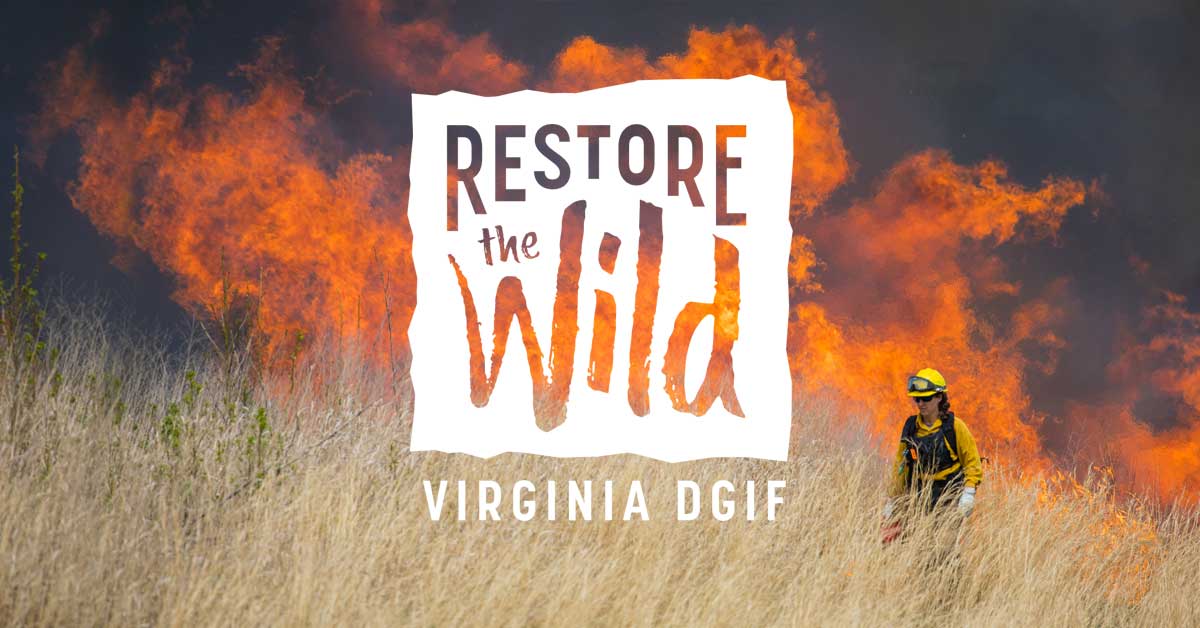
By Emily George
Many of you reading this undoubtedly hunt or fish. Whether you do or don’t, DWR’s Restore the Wild initiative is something that all outdoor enthusiasts need to consider being a part of. This initiative will ensure that Virginia’s most treasured species have quality places to dwell for generations to come. Restore the Wild is for everyone that has a heart for nature, by reconnecting to it, and protecting the very gifts that give us passion.
It’s inevitable that opportunities and resources for hunters and anglers don’t exist like they used to. Rapid development, less land access, and poor wildlife habitat have contributed to various species of wildlife (game and nongame species) declining in numbers and quality of life. Restore the Wild is a funding solution that was generated to solely benefit habitat restoration in Virginia. All hunters should be firm activists for such an objective. Without providing essential habitat game species need, our favorite recreational heritage cannot be passed to the next
generations.

“With an increased demand on land, and changes of habitat with development, this funding mechanism allows us to have an earmarked fund that goes specifically to wildlife habitat,” says Brian Moyer, Deputy Director of Outreach at DWR. As a hunter, Moyer hopes that other hunters are passionate enough about the species they hunt to participate in this goal.
Similar to the Duck Stamp that benefits waterfowl and wetlands, proceeds from Restore the Wild will benefit other game species by allocating the money for restoring habitat to produce abundant wildlife populations by providing them with a better quality of life. Restore the Wild will focus on restoring the environment for a hunters favorite species such as turkeys, quail, woodcock, bear, deer, and other upland species.

“A duck stamp is just for wetlands and waterfowl, but this will be for a larger variety of species. As a hunter, that is what is appealing to me,” says Moyer. “I’ve seen duck stamps help duck populations, and I hope this will help our upland wildlife populations.”
 A Restore the Wild membership will aim to ensure that hunters have healthy populations of species they like to hunt. It will help to increase habitat for species that are declining, like quail and woodcock, and it will create more available access to new and high-quality places to hunt. Restore the Wild is an absolute form of wildlife conservation, and without conservation, hunters and anglers would not be able to pursue their favorite activities.
A Restore the Wild membership will aim to ensure that hunters have healthy populations of species they like to hunt. It will help to increase habitat for species that are declining, like quail and woodcock, and it will create more available access to new and high-quality places to hunt. Restore the Wild is an absolute form of wildlife conservation, and without conservation, hunters and anglers would not be able to pursue their favorite activities.
“I have seen animal numbers decline because of loss of habitat,” says Moyer. “This is an opportunity to give money to habitat work for upland game species that we are passionate about hunting.”
The membership fees will be aimed to restore publicly accessible land. Funding generated from Restore the Wild will primarily focus on WMA restoration, but could potentially include restoration of national public land, state forests and even some private land.


Restoration projects might include restoration of streams, creeks, and rivers, controlled burns, thinning timber, planting warm season grasses, creating meadows for pollinators and quail, removing invasive species, and other forms of restoration. There are currently six habitat restoration projects ongoing in the state. Details about these projects can be found on the Restore the Wild section of the DWR website.
“It’s exciting as a hunter because of the future of access to good land,” says Moyer. “I also hope that it will help expand support for DWR. I want this to bring in people who love wildlife.” With your support, Restore the Wild has the potential to tremendously improve Virginia’s public hunting opportunities that will allow our favorite tradition to thrive for the future.

Now, more than ever, we need your help to address the needs of our declining wildlife populations.
DWR invites you to join us in our mission to ensure wildlife has healthy places to live and thrive.
Learn About Restore the Wild

